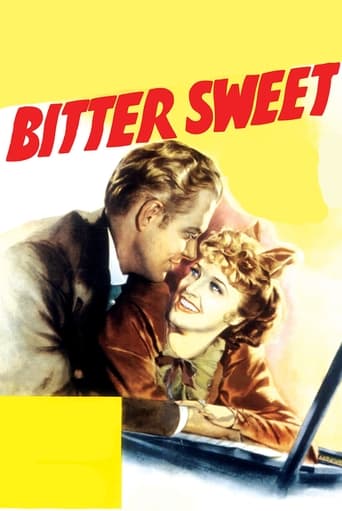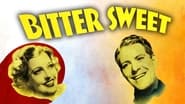jacobs-greenwood
Directed by W.S. Van Dyke, Noel Coward's play (treated by Lesser Samuels) and songs and the 1933 film was remade into this colorful costumer and musical romance drama for Jeanette MacDonald and Nelson Eddy (fans). It received Oscar nominations for its Color Art Direction and Cinematography. The cast also includes George Sanders, Ian Hunter, Felix Bressart, Sig Ruman, Veda Ann Borg, and Herman Bing (among others).In London, 1891, hopelessly romantic Sarah Millick (MacDonald) skips out of her arranged marriage to elope with her penniless Viennese music tutor Carl Linden (Eddy), much to the dismay of her mother (Fay Holden), her dullard foreign minister fiancé Harry (Edward Ashley), and his mother Lady Daventry (Janet Beecher), though her friend Dolly (Lynne Carver) is delighted. Carl & Sari (as he calls her) immediately leave for Vienna where, after she has a chance meeting with Baron Von Tranisch (Sanders), the couple is greeted enthusiastically by Carl's friends Ernst (Curt Bois) and Max (Bressart). The celebration is continued, later, at Mama Luden's (Greta Meyer) restaurant.After a year, the Lindens are still happy and poor. Sari begins to write a letter home to ask for money, but instead ends up offering her services as a singing tutor to a market keeper (Bing) for food. Unable to sell his completed operetta, Carl ends up inadvertently bungling her arrangement. Ernst & Max, who have a penchant for pawning Carl's possession for food & drink, have an idea - play outside the baths in Bonn in hopes of attracting a millionaire's ear. The four of them do just that and, hearing Sari sing Carl's operetta, British Lord Shayne (Hunter) believes that it brings him luck in his card game with the Baron and others. He sends them money to continue but, after the Baron loses to Shayne, he looks out the window and recognizes pretty Sari. The Baron then sends a messenger to take the makeshift band away, to a job working at Herr Schlick's (Ruman) café.Schlick doesn't know what to do with the players until he sees Sari, then he hires her & the others and fires Manon (Borg, barely in two scenes), who'd been the Baron's previous mistress. Even though Sari is never asked to sing, she & Carl are oblivious to the arrangement between Schlick and his regular customer the Baron, who insists that the café owner keep his mistresses employed for his (own purposes &) excellent patronage. When by chance, Harry Daventry visits with his wife Jane (Diana Lewis), the Baron's arrangement becomes clear to Sari, who then quits Herr Schlick. The Baron is naturally furious with the café owner when he learns that his new mistress won't be dining with him, but Schlick tells dishwashers Ernst & Max that the famous (producer?) Herr Wyler (Charles Judels) will be coming to his café that night. The friends tell Sari of it and, seeing a chance to sing Carl's operetta for him, she joins a surprised Carl (who plays the piano there) at Schlick's. But it is Schlick that is surprised when he learns that Wyler really is there, brought by Lord Shayne to hear Sari sing. Just as she's completed singing the operetta, the drunken Baron accosts her, initiating a fatal duel between the master military swordsman and poor Carl.But the show must go on. Sari refuses Harry & Jane's offer to return to London with them; her home is now the place that Carl loved, Vienna. With Wyler and Shayne's help, Carl's opera is produced, performed by Sari to great success, one which is "bitter sweet".The film ends with a fantasy sequence much like an earlier MacDonald/Eddy vehicle, Maytime (1937), does.
richard-1787
I've seen the Noel Coward operetta on which this movie is - loosely - based, and I didn't much care for that either. MacDonald/Eddy movies worked when the music was good and well staged, but that isn't the case here. The one big number, "I'll see you again," is over within the first five minutes. From there on, it's just forgettable imitation Viennese operetta music ("Tokay," "Ziguener," etc.).Normally, this is one of their movies that I take a pass on.But when I watched it today, I couldn't help notice how heavily it stresses that England is sexually and emotionally very repressive. The romantic couple flees to Vienna, which is described over and over as "gay." When they arrive, they are met by several of the male lead's male friends, who are very effusive in expressing their delight at seeing him.Which set me to wondering: was someone - Coward, the screenwriter - trying to set this up as an allegory of gay Coward's own feelings of sexual repression in England? The male lead, very much unlike in most movie operettas of the time, gets killed in the end, and by a military bully, just the sort who would pick on a gay man. (Though the male lead in this movie is certainly not presented as gay.)Just a thought.
TheLittleSongbird
Bitter Sweet is not up there with New Moon and especially Maytime(out of their collaborations), but it is not their worst, that would be- though from a personal perspective it wasn't as bad as heard- I Married An Angel. Bitter Sweet does have things wrong, the story is silly, at times draggy and also a little choppy, the Baron's wife is an annoying character and is played even worse and Nelson Eddy's acting is rather stiff, he also has as much conviction as an Austrian as John Wayne did as Genghis Kahn in The Conqueror. It's not as if his acting is like that in all his films, it was great in The Chocolate Soldier for instance where he does show some gift for comedy. Bitter Sweet looks incredible though, out of Eddy-MacDonald's outings it is one of their best-looking. The costumes and sets are very sumptuous, the set for Zigeuner stands out. The Technicolor photography is the very meaning of exquisite. Fabulous also are the songs, Noel Coward's first score and one of his greatest too, I'll See You Again and Zigeuner are the best of the bunch. The dialogue is snappy and sweet, with some appropriate seediness for the baron, the choreography does have energy and W.S. Wise's direction while not landmark-standard is perfect for the type of film Bitter Sweet is, charming and solid with a light touch. There is a good supporting cast, George Sanders is wonderfully smarmy and lecherous in another one of his caddish roles, Hermann Bing is very funny and Ian Hunter shines at being distinguished. Jeanette MacDonald is as beautiful and charming as ever, and her performance carries Bitter Sweet very nicely, she was always better in the acting stakes than Eddy. Though Eddy was the better singer, it is difficult to ever find fault in Eddy's rich, warm baritone singing and while personally it isn't a problem MacDonald's somewhat thin-toned at times, trilly soprano is an acquired taste. Both she and Eddy sing absolutely beautifully throughout, together and individually, and their chemistry is convincing. All in all, still much to enjoy but not one of their best. 7/10 Bethany Cox
mark.waltz
Even though Jeanette MacDonald gets to make light fun of her sometimes shrill singing voice (where her lyrics are sometimes impossible to understand) and has a brief can-can musical number (showing off a rarely seen ability to dance), the movie surrounding those moments is colorless, even though it was grandly photographed in color. All the color does is show off her flaming red hair, which in the final is covered by a hat that looks like a pepperoni pizza with extra mozzarella. The fact that this is set in 1890's London and Vienna rather than Italy makes her choice of millinery attire somewhat odd.In London, she is a singer being coached by operetta composer Nelson Eddy, obviously in love with him even though she is engaged to marry the stuffy Edward Ashley. She suddenly decides to break off her engagement to Ashley and runs off to Vienna where as a street singer, she is broke enough to trade singing lessons from a grocer whose untalented daughter sings like the chicken she is making the exchange for. She is noticed by the lecherous Baron George Sanders who arranges for her to get a job at a casino while Eddy tries to sell his unproduced operetta. Ashley arrives in Vienna as Sanders is making unwelcome advances to her with his new wife, a babbling female with a horrendous speech impediment, obviously added just to make her already annoying character seem even more annoying. When a drunken Sanders goes too far in his pursuit of the married MacDonald, Eddy steps in, setting up for a similar finale that we had already seen them do in "Maytime" and would be done better in MacDonald's remake of "Smilin' Through".The ending probably had ladies weeping in 1940 but is so predictable. Sanders' character so unlikable that it makes him difficult to watch. He was best playing villains who were so urbane and sophisticated that their suave villainy was just one characteristic to their multi-layered personalities. The stars struggle with many bits made to be comical (which essentially stop the plot for shtick) but somehow the results are as empty as Sanders' baron's heart. Practically every character actor of eastern European decent (Herman Bing, Felix Bressart) pop in to predictable effect. W.S. Van Dyke, after such a unique career highlighted by mostly non-musicals, seemed an odd choice for this air-filled soufflé, so the result is even less than mixed.




